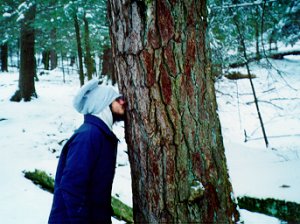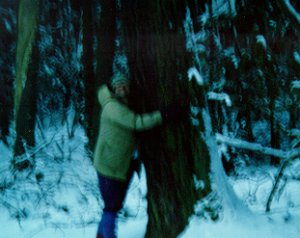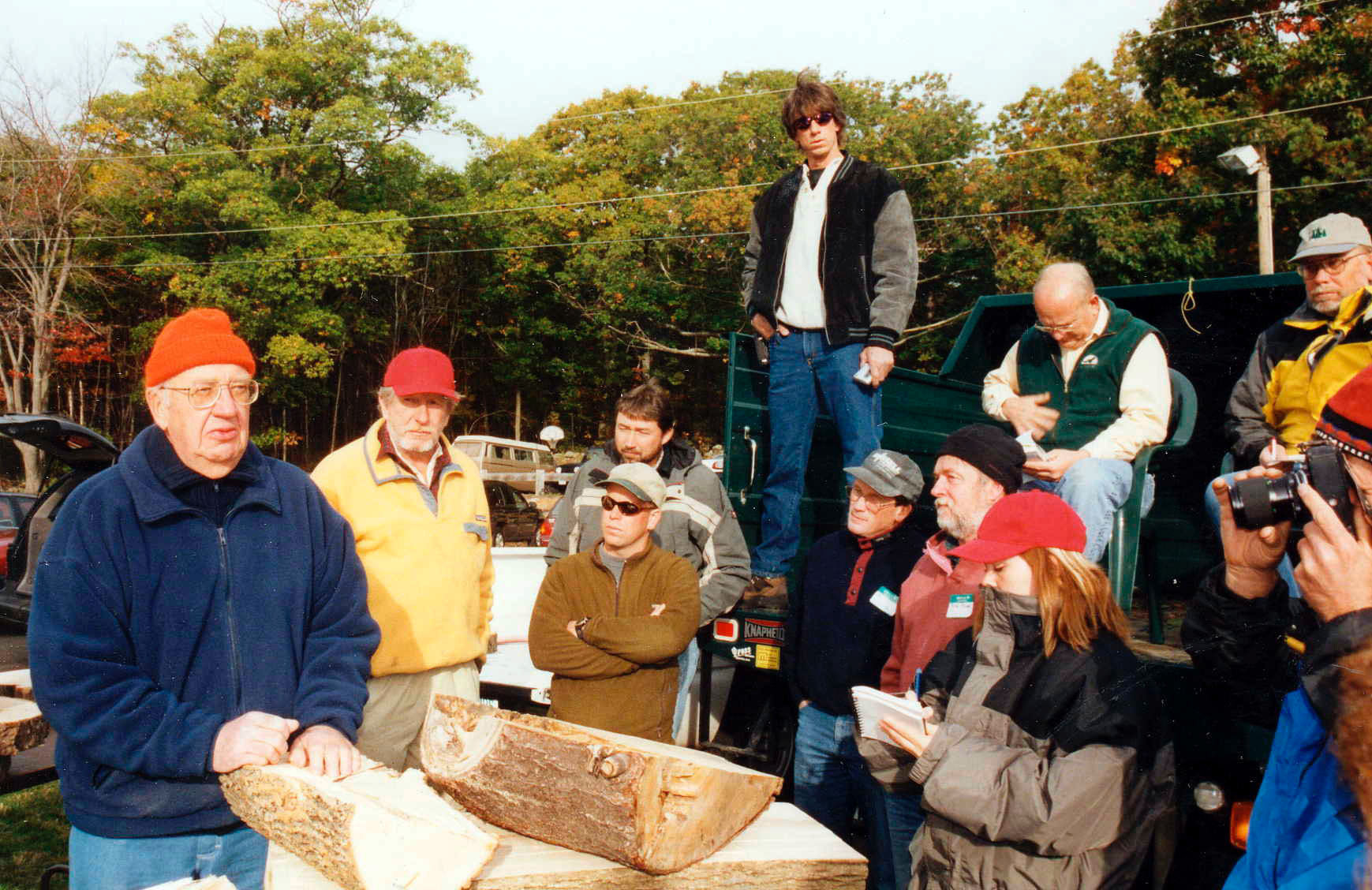

A TREE KISSER
The US Forest Service reports that due to a mild winter and
over population of certain species of trees in the Alleghenies, a timber
sale is needed to reduce the risk of infestation of what is now known as the
Tree Kisser. John Palmer, the US Forest Supervisor is quoted as saying “The
tree kisser population is growing at an alarming rate. We do hope the new
East Side Project will remove most of the host. Clear cutting and fencing
along with a herbicide treatment (to kill plants above and below ground) may
do the trick. One thing for sure these Tree Kissers do not like grass
planted in the forest or do they like roads. "We are very concerned that the Tree
Kisser
will take over the entire National Forest. It's something like that dang
Tree Hugger infestation”

A TREE HUGGER
The Tree Kisser is very similar to the Tree Hugger. One specific difference between a Tree Hugger and a Tree Kisser, to tell them apart, is the Tree Hugger will use his or her arms and parts, other than the head, to attack the tree. The Tree Kisser, leans forward until there is lip contact with ecosystems of microorganisms, that live on the outer bark, the phellem, and procedes to kiss. A kiss from a Kisser can last from several seconds to as long as 24 hours. I.e., according to one source. No one really knows for sure.

TREE TOUCHERS in Portsmouth NH USA. Learning about trees based on correct information. In the history of mankind, never has such correct information been available to humans. Also,on the other hand, in other places, in the history of mankind have so many people talked so much about something they know so little about. Their environmant. BUT NOT THESE LEARNERS AND EARNERS. Many are BOONITES.
Environmentalist are quoted as saying “Treekissers and Huggers, as well as Tree Touchers are not a harm to the entire system, i.e., just by the act. In certain cases a Tree Hugger, could hug a tree to death, however that is more the exception than the rule and would not harm the ecosystem. I.e., if the wood is not removed. Trees that no longer are growing, building up, not maintaining a symplast, have a way of creating homes for wildlife, maintaining required moisture regime and feeding many soil associates. I.e., just for starters. One thing to understand is that the Kissers are not cutting the wood out of the once fertile forest. Certain studies have shown, that through bacteria and such there may be more of a positive connection, or synergistic connection between the Tree Kisser and the tree, than what has been previously reported by the Forest Service. [Phytopathology 54: 250-278; 1964 Bier, J.E. The Relation of some bark factors to canker susceptibility.] One thing for sure, the US FOREST SERVICE, does not need to log to control Tree Kissers. This is just another excuse to log. When actually the fragmentation, herbicides, roads and clear cuts disturb habitat for these wonderful creatures" and most importantly alter the moisture regime in a serious negative manner. In 2018 in California the most historical and deadly once fertile forest fire, Camp Fire, was the heaviest logged ecosystem that burnt!!! Trees are a NON-RENEWABLE NATURAL RESOURCE." The Kissers have a website addressing the untold story as to what logging is on Federal Public Land.
Treekissers are seldom caught on film.
Above was created in late 1990's.
They can be placed in three categories.
1. A Tree Hugger believes in not cutting trees, even in cases where the tree may poses a high risk of hazard. However, too often I have witnessed their desire to remove trees and wood, from the ecosystem, where the trees have buildup and have begun to break down, and release the energy back to the soil and act as a serious water reservoir, for trees and associates, during dry times. They believe somehow trees are only of value to trees, and others around them, while they are building up. Lack of understanding of TREE BIOLOGY.
2. A Tree Toucher - A person studying TREE BIOLOGY, reading Modern Arboricultur.
3. The Tree Kissers are more into the act of kissing then destroying ecosystems by removing wood.
2019 update and more information on the Tree Kisser and the outer bark of trees they tend to kiss.
Dr. Alex L. Shigo worked with others and wounded 15,000 trees isolating hundreds of thousands of microorganisms successionary on fresh wound surfaces. They then mapped them in a mapping room. Then the biggest thing is "they identified the hundreds of thousands of microorganisms. I.e., with electron microscopes. Now, since Dr. Alex L. Shigo stopped doing that type of research no one else has continued. Primarily due to fact that no one on Earth can identify the microorganisms correctly. Very little research has been done on the ecosystems of microorganisms that live on outer bark of trees. Very little is known and that is where we remain. No one will be able to conduct such extensive research due to lack of identification skills. The biggest thing when wood is removed, is that the moisture regime is gravely altered. In fact George Hepting reported in "Diseases of Forest and Shade Trees of United States", 1971 that if you went to an area that hemlocks are doing well [old growth], removed a small amount of wood, the hemlocks will die prematurely as the water regime is altered so much. POST LOGGING DECADENCE. Same basic research Shigo worked on.
SO SAD these features of a system which represents GOOD HEALTH CARE for humans, destroyed.
Now in USA in 2019 we have a President, Donald J. Trump, who has been captured in film as a flag hugger and kisser. Respectfully I'll leave that for him to define and address.
Dictionary
MAIN
PAGE
Text & Graphics Copyright © 2019 Keslick & Son Modern Arboriculture
Please report web site problems, comments and words of interest,
not found.
Contact